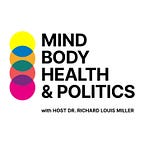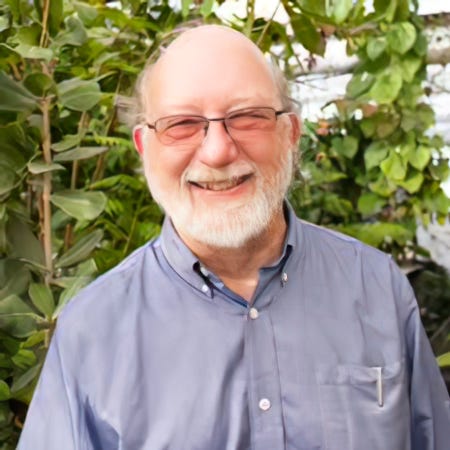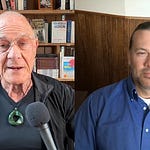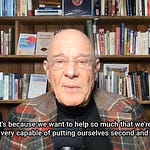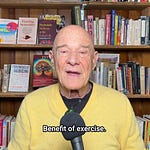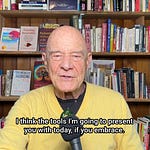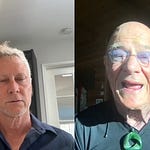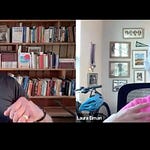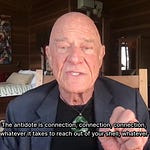Dear Listeners,
I’m delighted to welcome back the phenomenal Dennis McKenna to Mind Body Health and Politics today. Dennis has dedicated over five decades to researching and understanding psychedelic plants and fungi. His presence radiates an aura of wisdom — it was love at first sight when we met at Wilbur Hot Springs years ago.
Dennis's vast knowledge of these powerful substances is unmatched. We’ve explored many captivating topics together before, including his memoirs – The Brotherhood of the Screaming Abyss – but today marks our first deep dive into the risks and adverse effects that can sometimes occur with psychedelics. While these tools offer remarkable potential for healing when used responsibly, we must also understand how to navigate challenges should they arise.
Psychedelics are generally non-toxic to the body, especially compared to other drugs. However, all potent substances carry risks. Our aim is to minimize adverse effects while benefiting from their incredible gifts.
The key factors include:
the substance itself
the dose
the mental set or intention you bring, and
the physical setting or context for the experience.
With mindful preparation beforehand and integration of insights afterward, psychedelics can provide life-changing perspectives.
Yet psychedelic states also differ radically from ordinary consciousness. Insights gained should be examined critically once back to a baseline state. As Dennis notes, psychedelics can act as tricksters at times. It’s wise to reflect on any drastic life decisions suggested during a session, rather than act rashly. Raw insights require integration to become wisdom, and ceasing use for a period allows for realignment.
Rare persistent effects can also occur, like HPPD – hallucinogen persisting perception disorder.
Anxiety, panic attacks or temporary delusional thinking may also arise, especially without proper support and guidance to navigate the psychedelic space. Finding competent sitters or guides is crucial, but takes due diligence.
Not everyone will exercise this due diligence, and the stakes are higher as more places decriminalize psychedelics. Just last week, Berkeley voted to decriminalize - joining the ranks of Denver, Oakland, and the state of Oregon. In the interview with Dennis that was featured in the book Psychedelic Wisdom, he recounted his first experience with psychedelics while visiting his older brother Terence McKenna at UC Berkeley. Terence McKenna became a counter-cultural icon, while Dennis chose the more buttoned up academic route of becoming an ethnobotanist. Both brothers have a great deal of wisdom to share for those who have ears to hear it. Terence tragically died young of a rare form of brain cancer. We can hope that Dennis will live long and continue to nourish the movement with his expertise and wisdom.
As always, Dennis models reverence for psychedelics’ power, balanced with prudent care in their use for healing and growth. His life’s work continues through endeavors like the McKenna Academy of Natural Philosophy, cultivating responsible understanding. I’m also honored to share more through our book, Psychedelic Wisdom.
I hope you’ll join Dennis and me today for a thoughtful discussion about safe, ethical engagement with psychedelic tools.
Golden light,
Dr. Richard L. Miller
Links and references:
Show notes:
What’s on Dennis’s radar screen nowadays? 4:40
The future of the herbarium.
Integrating traditional knowledge with modern science.
The importance of the UNEP herbarium.
The long-term goal of the project.
Introduction to adverse effects of psychedelics. 12:06
Adverse effects of medicinal plants.
Side effects of psychedelics.
Is ibogaine safe?
Be extra cautious in how ibogaine is used.
Be mindful of the dose.
How to define a psychedelic? 19:29
The four key variables to consider when using psychedelics.
The importance of setting setting.
The set is your mindset and the set is what you bring to it.
The importance of preparation beforehand and integration following psychedelic sessions.
Potential adverse effects of psychedelics. 29:20
Potential adverse effects of taking a large dose.
Therapeutic effect of psychedelics.
Lurking feeling of doing something wrong or even bad.
Potential adverse reactions to ayahuasca.
Potential for serotonin syndrome with MAO inhibitors.
Ayahuasca’s effects on hypertension. 36:39
Ayahuasca and tryptamines can have acute effects on blood pressure.
The effects of a heroic dose of LSD
Bypassing the working zone and going into the cosmic zone.
DMT and short acting tryptamines as the “rocket ship to the cosmos.”
Inclusion criteria in the John’s Hopkins study. 44:24
The difference between five-MEO DMT and DMT.
Freud's full beard and smoking a pipe.
Starting ayahuasca at night is ill- advised.
Johns Hopkins starts at 8 or 9 AM.
The importance of personal connection with a therapist.
How to find a psychedelic guide? 54:30
Ligare – the Christian psychedelic society helping people find reputable guides.
No one has ever died from LSD.
Importance of informed research before taking psychedelics.
HPPD, hallucinogenic persistent perceptual disorder]
How to get out of a state of delusion? 1:01:38
The first step is to stop taking psychedelics.
Caution is the better part of valor.
Transcript
Note: This transcript has been edited and condensed for clarity by Vergili.us.
Dr. Miller: Welcome to Mind, Body, Health and Politics. I'm your host, Dr. Richard Louis Miller. The mission of Mind, Body, Health and Politics is to enhance your physical and emotional well-being and encourage community. Community is essential, particularly at this time in history. Human beings are basically friendly, tribal animals, and when we associate with one another in small enough groups where we know each other by name or at least by face, we are cooperative. We enjoy doing things together, whether it's playing baseball, watching baseball, or participating in a sewing or reading circle. We love eating together in groups. Some of us even enjoy taking psychedelic medicines together in groups. We are tribal, good, and decent.
However, we must remember that there is a very small percentage of us who are different. They are predators who want to dominate. They have been this way since we lived in caves. They were the ones who came out of the caves with the biggest clubs, and they eventually became kings who subjected people to their rule. Throughout history, we have had these people, from the pharaohs in Egypt to Julius Caesar, who overthrew democracy and created an empire in Rome.
We must stay aware of these individuals and get out and vote to maintain our democracy and republic, where everyone is equal before the law and has one vote. This experiment has been ongoing since our revolution against the King of England and the church, and we must maintain it. As Thomas Jefferson once said, "Eternal vigilance is the price of liberty."
Preserving Indigenous Knowledge
Dennis, It's great to have you back. To start, what are the things that are on your radar screen nowadays as you go through life?
Dennis: Many things, as I don't seem to have any problem staying busy. What's primarily capturing my attention is this project called Bio Gnosis that we're working on through the McKenna Academy. Bio Gnosis bridges ancestral wisdom and scientific knowledge, creating a nexus where these two worldviews can complement and reinforce each other.
A key part of this involves the university in Iquitos, Peru that I've worked with for over 50 years. There is an herbarium at the university that has been important to me since I began ethnobotanical research as a graduate student in 1981. I have worked out of this herbarium ever since and now have a close friendship with the curator, an amazing fellow named Juan Reátegui. He represents a living library of knowledge that would be lost if he were no longer here.
One of the Bio Gnosis projects is to produce documentaries about the herbarium and the current state of indigenous communities in the Iquitos region. Our long-term goal is to digitize the herbarium and put it online in a way that integrates traditional knowledge. This will give indigenous people a chance to contribute and share their knowledge on the website. I'll be talking more about this at the Psychedelic Science Conference in Denver.
Dr. Richard Miller: I'll see you in Denver, Colorado in June. I understand you want to preserve historical information rather than lose it. And integrate it with modern science and knowledge - is that correct?
Dennis McKenna: Yes, that's correct. An herbarium is like a library - it contains dried plant specimens, which may seem boring but is very important. The Iquitos region is the center of Amazonian biodiversity, so these collections give a valuable snapshot of the flora over time as the environment changes. They help researchers track changes in plant distribution and status. The university herbarium has been neglected due to limited funding, but still exists. We want to raise funds to rescue it, upgrade it, and create a digital version. This is what herbaria worldwide aim to do. The Iquitos herbarium is worth saving given its unique biodiversity and medicinal plants. Our long-term goal is to digitize and preserve this knowledge.
Adverse Effects of Psychedelics
Dr. Richard Miller: In your long career as an ethnobotanist, you've studied many plants, especially medicinal and psychedelic ones. Today let's discuss the challenging topic of psychedelics' negative or adverse effects. As background, pharmaceutical companies often don't disclose negative results or sanitize them as mere "side effects." But these are frequently adverse and should be disclosed openly, not hidden. I believe psychedelic scientists should do the opposite: transparently tell the public the specifics - the percentages of certain side effects. So let's talk about emotional, physiological, and boundary adverse effects.
Dennis McKenna: Yes, well, a pharmacologist I respect told me once - show me a drug without side effects, and I'll show you a drug with no effects. Side effects aren't necessarily adverse, but they often are in the sense you'd rather avoid them. The effects may be minor or not life-threatening - they just come with the territory. Anytime you're altering physiology, you'll get a spectrum of effects. I don't know of any drug that selectively targets only the intended receptors without affecting anything else. That's not how physiology works - you can't fully separate the effects.


